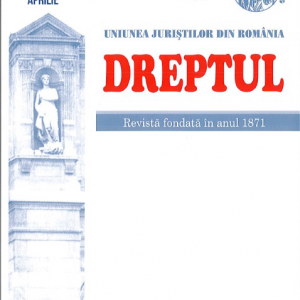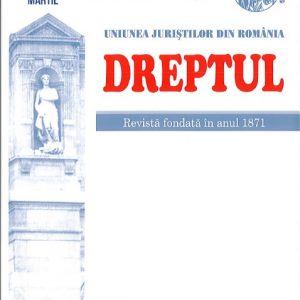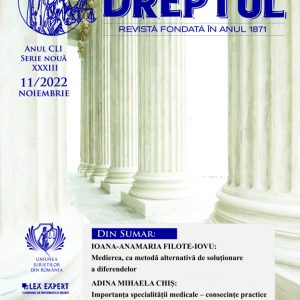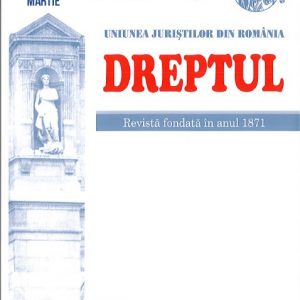-
 Despite its frequent recall, in legislation, jurisprudence and doctrine, the concept of “public order” is not only a vague, poorly determined and content-variable one, but also among the most controversial ones. Hereinafter, the authors of this study are trying to submit to the attention some of its characteristic traits, and then to provide some guidelines with regard to the implementation ex officio of “reasons of public order” by the Court for judicial review in the lawsuit.
Despite its frequent recall, in legislation, jurisprudence and doctrine, the concept of “public order” is not only a vague, poorly determined and content-variable one, but also among the most controversial ones. Hereinafter, the authors of this study are trying to submit to the attention some of its characteristic traits, and then to provide some guidelines with regard to the implementation ex officio of “reasons of public order” by the Court for judicial review in the lawsuit. -
 Nu există vreun temei pentru a crea o ordine de preferință a declarațiilor, în sensul reținerii celor date în faza de judecată, în detrimentul celor date în faza de urmărire. Principiul liberei aprecieri a probelor nu permite distincția dintre probele administrate în faza de urmărire și cele administrate în faza de judecată și se opune ca cele din urmă să fie luate în considerare în detrimentul celor dintâi, numai pe criteriul fazei procesuale în care au fost obținute. Singurul criteriu care trebuie avut în vedere atunci când o probă este fie reținută pentru a contura o situație de fapt, fie înlăturată din ansamblul tuturor probelor existente în dosar este cel al coroborării probei în discuție cu celelalte probe administrate.
Nu există vreun temei pentru a crea o ordine de preferință a declarațiilor, în sensul reținerii celor date în faza de judecată, în detrimentul celor date în faza de urmărire. Principiul liberei aprecieri a probelor nu permite distincția dintre probele administrate în faza de urmărire și cele administrate în faza de judecată și se opune ca cele din urmă să fie luate în considerare în detrimentul celor dintâi, numai pe criteriul fazei procesuale în care au fost obținute. Singurul criteriu care trebuie avut în vedere atunci când o probă este fie reținută pentru a contura o situație de fapt, fie înlăturată din ansamblul tuturor probelor existente în dosar este cel al coroborării probei în discuție cu celelalte probe administrate. -
 Article 322 section 5, second phrase of the (Romanian) Code of Civil Procedure provides that review of a final and binding decision in the Appellate Court or non-appealed and of a ruling passed by a court of last resort upon merits called forth may be requested „whether, following the rendering of the decision, a court order which grounded the decision under review claimed was abated or amended.” The author, in light of the practice of the European Court of Human Rights, considers that the purport should be interpreted narrowly. Accordingly, the scope of Article 322 section 5, second phrase of the (Romanian) Code of Civil Procedure may cover uncertified court orders exclusively (referred to as binding) because only these can be amended / abated under appeal or recourse, and not judgments passed within right of review procedures such as review or appeal for annulment, on account of complying with the principle of legal certainty.
Article 322 section 5, second phrase of the (Romanian) Code of Civil Procedure provides that review of a final and binding decision in the Appellate Court or non-appealed and of a ruling passed by a court of last resort upon merits called forth may be requested „whether, following the rendering of the decision, a court order which grounded the decision under review claimed was abated or amended.” The author, in light of the practice of the European Court of Human Rights, considers that the purport should be interpreted narrowly. Accordingly, the scope of Article 322 section 5, second phrase of the (Romanian) Code of Civil Procedure may cover uncertified court orders exclusively (referred to as binding) because only these can be amended / abated under appeal or recourse, and not judgments passed within right of review procedures such as review or appeal for annulment, on account of complying with the principle of legal certainty. -
 Un element care trebuie avut în vedere atunci când se abordează problematica disciplinei Drept parlamentar este frecvența utilizării acestui termen în literatura de specialitate, precum și în programele studiilor de licență sau masterat ale facultăților cu profil juridic, ori ale unor facultăți de științe politice, în care disciplina Dreptul parlamentar s-a studiat și, poate, se studiază încă, ca disciplină/materie de sine stătătoare. Chiar și în limbajul comun termenul de drept parlamentar este suficient de bine încetățenit, ceea ce poate da naștere unei percepții publice eronate, asupra autonomiei sale, ca ramură individuală a sistemului de drept, față de alte ramuri ale dreptului, și, în mod deosebit, față de dreptul constituțional ...
Un element care trebuie avut în vedere atunci când se abordează problematica disciplinei Drept parlamentar este frecvența utilizării acestui termen în literatura de specialitate, precum și în programele studiilor de licență sau masterat ale facultăților cu profil juridic, ori ale unor facultăți de științe politice, în care disciplina Dreptul parlamentar s-a studiat și, poate, se studiază încă, ca disciplină/materie de sine stătătoare. Chiar și în limbajul comun termenul de drept parlamentar este suficient de bine încetățenit, ceea ce poate da naștere unei percepții publice eronate, asupra autonomiei sale, ca ramură individuală a sistemului de drept, față de alte ramuri ale dreptului, și, în mod deosebit, față de dreptul constituțional ... -
 Marcarea Centenarului Marii Uniri (1918–2018) a ridicat fundamentala problemă a abordării unitare, din perspectiva succesiunii în timp a reglementărilor, impactului lor social și evoluției ideilor, a dezvoltării juridice a României la scara ultimului secol, relevându-se, totodată, și pe această bază, mizele prezentului și provocările viitorului pe termen mediu și lung. Acest eveniment a oferit ocazia unei analize complete și în spiritul adevărului istoric a fenomenului complex și major al unificării juridice interbelice – legislativă, judiciară și doctrinară – ca parte inseparabilă a procesului de desăvârșire a unității naționale și fundament organic al științei dreptului și culturii juridice românești.
Marcarea Centenarului Marii Uniri (1918–2018) a ridicat fundamentala problemă a abordării unitare, din perspectiva succesiunii în timp a reglementărilor, impactului lor social și evoluției ideilor, a dezvoltării juridice a României la scara ultimului secol, relevându-se, totodată, și pe această bază, mizele prezentului și provocările viitorului pe termen mediu și lung. Acest eveniment a oferit ocazia unei analize complete și în spiritul adevărului istoric a fenomenului complex și major al unificării juridice interbelice – legislativă, judiciară și doctrinară – ca parte inseparabilă a procesului de desăvârșire a unității naționale și fundament organic al științei dreptului și culturii juridice românești. -
 The author intends to make a synthesis of the main amendments brought by the legislator to the civil liability institution, by adopting the present Civil Code, also analyzing the main sources of inspiration underlying the new regulation. The chosen approach is a comparative one, the civil liability institution being analyzed both from the perspective of the Civil Code of 2009 and of the Civil Code of 1864. The study aims to emphasize that the new regulation is a codification of the doctrine and of the case-law, in a necessary attempt to adapt the Romanian legislation to the soft-law standards of the European Union in this matter, as well as to the other international regulations.
The author intends to make a synthesis of the main amendments brought by the legislator to the civil liability institution, by adopting the present Civil Code, also analyzing the main sources of inspiration underlying the new regulation. The chosen approach is a comparative one, the civil liability institution being analyzed both from the perspective of the Civil Code of 2009 and of the Civil Code of 1864. The study aims to emphasize that the new regulation is a codification of the doctrine and of the case-law, in a necessary attempt to adapt the Romanian legislation to the soft-law standards of the European Union in this matter, as well as to the other international regulations. -
 According to Article 46 of the Romanian Constitution, „The right to inheritance is guaranteed”. Thus, we find that the constitutional text is of a maximum concision. The correct and complete understanding of the text requires, indeed, some developments firstly related to the branch of the civil law, mainly in matters of successions but also to the real rights, being concerned, especially, the institution of the property right. Thus, in the following article, there will be presented briefly the following aspects, which we consider to be of interest for the right to inheritance: the notion of inheritance and the specific terminology, the types of inheritance, the conditions of the right to inheritance, the successoral option, the right of the foreign citizens and of the stateless persons to acquire, by inheritance, the private property right on lands in Romania.
According to Article 46 of the Romanian Constitution, „The right to inheritance is guaranteed”. Thus, we find that the constitutional text is of a maximum concision. The correct and complete understanding of the text requires, indeed, some developments firstly related to the branch of the civil law, mainly in matters of successions but also to the real rights, being concerned, especially, the institution of the property right. Thus, in the following article, there will be presented briefly the following aspects, which we consider to be of interest for the right to inheritance: the notion of inheritance and the specific terminology, the types of inheritance, the conditions of the right to inheritance, the successoral option, the right of the foreign citizens and of the stateless persons to acquire, by inheritance, the private property right on lands in Romania. -
 The issue of the content of the crime is treated through the prism of two criminal legislations and doctrines - of Romania and of the Republic of Moldova in the present study. The objective pursued by the authors is the substantiation of the perspective of a unique concept of approaching crime as a basic institution of criminal law in the Romanian space. The criminal legislation of the Soviet Union had an excessive impact on the evolution of the criminal legislation of the Republic of Moldova. Even today, some Moldovan criminal law institutions, including crime law, are approached from the perspective of concepts and perceptions that characterized the Soviet doctrinal system. As a result of this research, the authors, using mainly the comparative method of studying law, have argued the theoretical foundations that may constitute the basis for the approximation of the above-mentioned doctrines in addressing the content of the crime. However, the good knowledge of the issue of the legal content of the crime allows the description of the crimes by the strict observance of the quality standards of the criminal law, thus ensuring the principle of legality of the incrimination.
The issue of the content of the crime is treated through the prism of two criminal legislations and doctrines - of Romania and of the Republic of Moldova in the present study. The objective pursued by the authors is the substantiation of the perspective of a unique concept of approaching crime as a basic institution of criminal law in the Romanian space. The criminal legislation of the Soviet Union had an excessive impact on the evolution of the criminal legislation of the Republic of Moldova. Even today, some Moldovan criminal law institutions, including crime law, are approached from the perspective of concepts and perceptions that characterized the Soviet doctrinal system. As a result of this research, the authors, using mainly the comparative method of studying law, have argued the theoretical foundations that may constitute the basis for the approximation of the above-mentioned doctrines in addressing the content of the crime. However, the good knowledge of the issue of the legal content of the crime allows the description of the crimes by the strict observance of the quality standards of the criminal law, thus ensuring the principle of legality of the incrimination. -
 In the study hereby, the author sets under review the body search institution, from the perspective of theoretical and practical approaches. Body search has a distinct character, being undertaken in some cases separately from other evidence procedures, but it is also frequently undertaken on home searches, detention or arrest of a person. The author puts forward, within the study, the main legal regulations applicable in the field of body search, focusing on the new amendments to the new Code of Criminal Procedure, and reasoning some de lege ferenda proposals.
In the study hereby, the author sets under review the body search institution, from the perspective of theoretical and practical approaches. Body search has a distinct character, being undertaken in some cases separately from other evidence procedures, but it is also frequently undertaken on home searches, detention or arrest of a person. The author puts forward, within the study, the main legal regulations applicable in the field of body search, focusing on the new amendments to the new Code of Criminal Procedure, and reasoning some de lege ferenda proposals. -
 The study analyzes the opinion on the repeal of the filter procedure when the review in the civil trial is within the competence of the High Court of Cassation and Justice. The author presents the analysis of the manner the filter procedure was regulated by the Law No 134/2010, the Civil Procedure Code and the arguments for which it considers that the repeal of this procedure is not justified. The result of the study is reflected in the opinion according to which the filtering procedure had to be maintained, for the settlement of the reviews in the civil trial, by the supreme court. The filter procedure was first introduced in the civil processual legislation by the Government Emergency Ordinance No 58/2003. Those provisions introduced a new procedure of settlement of the review, irrespective of the court which settled the review, that of the admissibility in principle of the review, prior to the actual settlement of the application for review, which carried out the preliminary examination of the application for review. By the Law No 134/2010 the filter procedure has been regulated only in case the review was settled by the High Court of Cassation and Justice. By the Law No 310/2018, amending and supplementing the Civil Procedure Code, the filtering procedure has been repealed although, in the initial form, it was proposed to put the text of Article 493 of the Civil Procedure Code in agreement with the provisions of the Decision of the Constitutional Court No 839/2015, which has declared unconstitutional the phrase „or that the review is manifestly unfounded”. In this respect, the text of Article 493 (5) of the Civil Procedure Code should have been as follows: „In case the panel unanimously agrees that the review does not meet the formal requirements, that the grounds invoked and their development do not fall within those provided by Article 488, it shall cancel the review by a reasoned decision, pronounced without the summoning of the parties, which is not subject to any means of appeal. The decision shall be communicated to the parties”. Maintaining the filter procedure, in our opinion, contributes to decongesting of the supreme court to settle the reviews that do not meet the conditions for exercising this extraordinary means of appeal.
The study analyzes the opinion on the repeal of the filter procedure when the review in the civil trial is within the competence of the High Court of Cassation and Justice. The author presents the analysis of the manner the filter procedure was regulated by the Law No 134/2010, the Civil Procedure Code and the arguments for which it considers that the repeal of this procedure is not justified. The result of the study is reflected in the opinion according to which the filtering procedure had to be maintained, for the settlement of the reviews in the civil trial, by the supreme court. The filter procedure was first introduced in the civil processual legislation by the Government Emergency Ordinance No 58/2003. Those provisions introduced a new procedure of settlement of the review, irrespective of the court which settled the review, that of the admissibility in principle of the review, prior to the actual settlement of the application for review, which carried out the preliminary examination of the application for review. By the Law No 134/2010 the filter procedure has been regulated only in case the review was settled by the High Court of Cassation and Justice. By the Law No 310/2018, amending and supplementing the Civil Procedure Code, the filtering procedure has been repealed although, in the initial form, it was proposed to put the text of Article 493 of the Civil Procedure Code in agreement with the provisions of the Decision of the Constitutional Court No 839/2015, which has declared unconstitutional the phrase „or that the review is manifestly unfounded”. In this respect, the text of Article 493 (5) of the Civil Procedure Code should have been as follows: „In case the panel unanimously agrees that the review does not meet the formal requirements, that the grounds invoked and their development do not fall within those provided by Article 488, it shall cancel the review by a reasoned decision, pronounced without the summoning of the parties, which is not subject to any means of appeal. The decision shall be communicated to the parties”. Maintaining the filter procedure, in our opinion, contributes to decongesting of the supreme court to settle the reviews that do not meet the conditions for exercising this extraordinary means of appeal. -

-
 The purpose of the present analysis is to determine the applicable legal regime to certain procedural acts made in bad faith in relation to the abuse of rights theory, and the lis pendens (same trial pending in the same time before two or more panel of judges) and joined cases institutions. The analysis started from a particular case in which a claimant filed two statements of claim having the same object in two considerably distant moments (7 years between them) against the same defendant. The only aspects which the claimant drafted differently in the second case file, in order to eliminate risk of identity, were the claims’ phrasing and some additional arguments in his favour which were not inserted in a proper form in the first case file. Nevertheless, through the second statement of claim, the claimant himself raised the lis pendens exception, in order to send the second case file in front of the initial judge and thus to overcome his incapacity to invoke additional arguments in the first case file. The court vested with the judgment of the lis pendens exception stated that the exception is applicable and in the case at hand. Thus, it has sent the second file to be analyzed together with the initial statement of claim. In addition to this, the court fined the claimant for misconduct represented by filing intentionally the two statement of claims having the same object. In consequence, in the present article we have analyzed the conditions to be met in order to state the presence of an abuse of rights in the light of the lis pendens and joined cases institutions. We have identified the purpose for the regulation of these legal institutions and the similarities and differences between them. In addition to this, we addressed the conduct which the court should have in order to correctly analyze the two statements of claim which are object of the lis pendens exception. Finally, our theoretical conclusions related to the three institutions were applied to our particular case, in order to prove the presence of an abuse of right.
The purpose of the present analysis is to determine the applicable legal regime to certain procedural acts made in bad faith in relation to the abuse of rights theory, and the lis pendens (same trial pending in the same time before two or more panel of judges) and joined cases institutions. The analysis started from a particular case in which a claimant filed two statements of claim having the same object in two considerably distant moments (7 years between them) against the same defendant. The only aspects which the claimant drafted differently in the second case file, in order to eliminate risk of identity, were the claims’ phrasing and some additional arguments in his favour which were not inserted in a proper form in the first case file. Nevertheless, through the second statement of claim, the claimant himself raised the lis pendens exception, in order to send the second case file in front of the initial judge and thus to overcome his incapacity to invoke additional arguments in the first case file. The court vested with the judgment of the lis pendens exception stated that the exception is applicable and in the case at hand. Thus, it has sent the second file to be analyzed together with the initial statement of claim. In addition to this, the court fined the claimant for misconduct represented by filing intentionally the two statement of claims having the same object. In consequence, in the present article we have analyzed the conditions to be met in order to state the presence of an abuse of rights in the light of the lis pendens and joined cases institutions. We have identified the purpose for the regulation of these legal institutions and the similarities and differences between them. In addition to this, we addressed the conduct which the court should have in order to correctly analyze the two statements of claim which are object of the lis pendens exception. Finally, our theoretical conclusions related to the three institutions were applied to our particular case, in order to prove the presence of an abuse of right.
